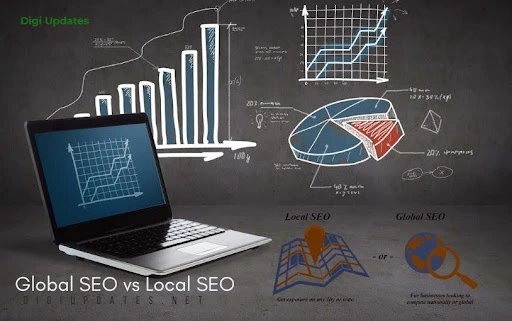Global SEO vs Local SEO: Mastering the International Search Landscape

Geographical barriers no longer limit businesses in the linked world of today. It’s now simpler than ever to reach a worldwide audience, which creates intriguing new prospects. However, it might be intimidating to navigate the complexities of foreign SEO.
What distinguishes local SEO from global SEO, and which one is more important for your company? Let’s embark on a journey to decode the nuances of both, explore proven global SEO tips, and unlock the potential of the international digital landscape.
Global SEO vs Local SEO:
- Global SEO: Aims to optimize your website for a worldwide audience, targeting users across different countries and languages. It focuses on broad keywords and ranking factors relevant to an international scale.
- Local SEO: Focuses on attracting users within a specific local area, like a city or region. It involves targeting local keywords, optimizing your Google My Business listing, and building local citations.
Which One Do You Need?
The answer depends on your business goals and target audience. Here’s a quick guide:
- Global SEO: Choose this if you offer products or services with international appeal, target a widespread audience, or have multiple physical locations around the world.
- Local SEO is the best option if your company, like a brick-and-mortar store or local service provider, primarily serves customers in a particular region.
The Magic of Merging Both:
Combining global and local SEO strategies can be incredibly powerful, especially for businesses with international ambitions. Imagine a travel agency with global ambitions but also offering specialized tours in specific cities. They can leverage global SEO for general travel keywords while implementing local SEO tactics to rank prominently for searches like “best city tours in Paris.”
9 Powerful Tips for Global SEO:
- Conduct Keyword Research: Analyze search trends in your target markets, identify relevant keywords, avoid keyword stuffing, and translate them accurately.
- Optimize for Multiple Languages: Adapt your website content and metadata to cater to your target languages, ensuring cultural nuances and SEO best practices.
- Utilize Country-Specific Domains: Consider using country-specific domains (e.g., .fr for France) or subdomains to improve local relevance.
- Embrace Localized Content: Create content tailored to local interests, cultural trends, and search habits in your target markets.
- Build High-Quality Backlinks: Secure backlinks from reputable websites in your target countries, prioritizing local relevance and language.
- Leverage International Link-Building Tools: Explore tools like HARO and Majestic to find link-building opportunities in specific regions.
- Claim and Optimize Local Listings: Register your business on relevant local directories and platforms like Google My Business, ensuring accurate information and positive reviews.
- Utilize Geo-Targeted PPC Campaigns: Run targeted Pay-Per-Click campaigns focusing on specific languages and locations for immediate impact.
- Measure and Adapt: Track your international SEO performance through analytics, and refine your strategies based on data and insights.
FAQs:
Q: Can I do international SEO myself?
A: While possible, working with an experienced international SEO agency can provide expert guidance and ensure optimal results.
Q: How long does it take to see results with international SEO?
A: Like any SEO strategy, it requires patience and consistent effort. Expect to see noticeable results within 3-6 months, with significant improvements coming later.
Q: How much does international SEO cost?
A: Costs vary depending on the scope of your campaign, target markets, and chosen agency. Invest in quality services for long-term success.
The world of international SEO is constantly evolving. Subscribe to Digiupdates.net for insightful blog posts, industry news, and expert advice to stay ahead of the curve and unlock the true potential of your global SEO strategy.
Remember, success lies in understanding your target audience, adapting your approach to local nuances, and consistently delivering valuable content that resonates across borders. Let’s embark on this exciting journey together!




